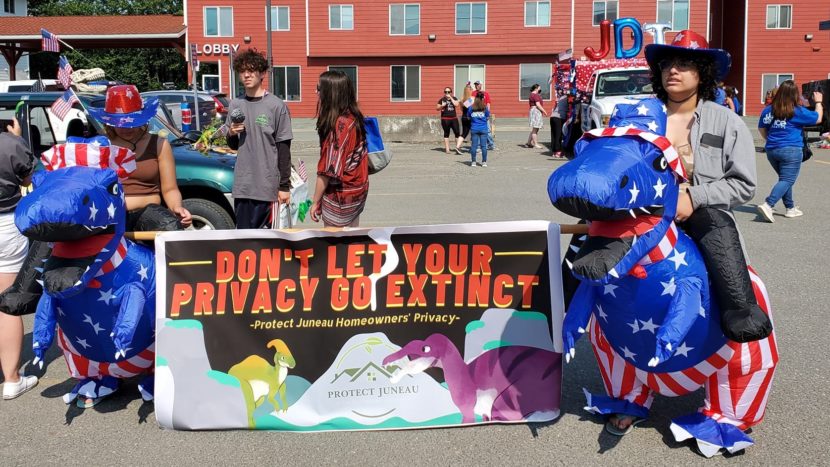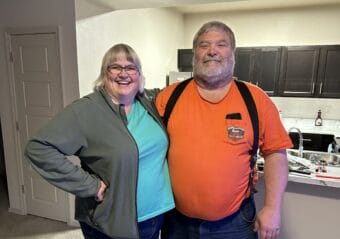
Is it OK for the City and Borough of Juneau to publicly take sides on local ballot questions? The Juneau Assembly wrestled with two versions of that question on Monday night before deciding “no” on both. Which means that in their official duties, city staff must stay neutral on the ballot questions in the October local election.
State law generally bars state agencies and local governments from using their resources to influence the outcome of elections. A 2018 Alaska Supreme Court opinion maintained that even using a city government’s email system can be a violation.
But using city resources to inform and educate the public is OK, City Attorney Rob Palmer explained.
Deputy Mayor Maria Gladziszewski asked, where is the line between informing the public and influencing the public?
“So it’s not ‘facts’ that are probably the most operative issue,” Palmer said. “It’s how those facts are stitched together and tell a story. So the legal standard is, have we spent money to influence the outcome of election?”
City Manager Rorie Watt explained what that means practically.
“It’s likely that we would have a very muted public involvement, and very limited. I would not want to put my staff in a position of making an APOC violation,” he said.
APOC is the Alaska Public Offices Commission, a state body that receives campaign finance complaints and issues fines for violations.
“It would be a fine line to walk on providing information,” Watt said. “Where and how you cross the line in a debate from providing factual information to expressing an opinion can be challenging.”
For example, there are some commonsense reasons why city officials want to consolidate current city offices spread across multiple buildings into a single, new city hall building. One upcoming ballot question, which the Assembly approved on Monday in a 7-2 vote, will ask voters to authorize the city to borrow up to $35 million to pay for a new city hall. Assembly members Greg Smith and Maria Gladziszewski voted no.
“In making the business case for city hall, some of those arguments are subjective arguments,” Watt said. “So saying things like, ‘Having all the offices in one place would be more convenient and more efficient.’ Are those facts or are those suppositions? I think it’s actually quite tricky.”
State law does leave a pathway for state agencies and local governments to legally campaign on ballot questions — on the condition that state lawmakers or local elected officials pass legislation that sets aside money specifically to influence the outcome of a ballot question.
That’s what prompted the Assembly’s debate on Monday. Watt had asked the Assembly to consider letting him and his staff support the city hall question and oppose a question to repeal a mandate to disclose real estate sales prices.
“To me, it doesn’t seem right that government would get involved in taking an advocacy position in an election, in a political matter like this,” said David Ignell of West Juneau during public testimony. “I think it sets very bad precedent.”
Assembly member Carole Triem was sympathetic to the point but struggled with how to vote on the real estate disclosure advocacy question.
Real estate professionals and developers are leading the repeal effort, which began with the citizen petition process. They say the policy is an invasion of privacy. The Juneau Assembly created the mandate in 2020 and added fines this past February. Most members think mandatory disclosure will lead to more accurate property assessments and more fairness in property taxes between different kinds of property owners.
“The benefits of mandatory disclosure are a lot more diffuse across Juneau, so it’s really unlikely that there’s going to be a competing advocacy group that organizes for the election to support mandatory disclosure,” Triem said.
Even though Assembly member Alicia Hughes-Skandijs called the pro-repeal side a “special interest,” she couldn’t get behind the city stepping in to oppose it.
“When I picture myself in the shoes of a citizen who got together with other citizens and gathered enough signatures, and knew I was getting something on the ballot, I ask myself how I would feel if then the government was spending my funds to work against me,” Hughes-Skandijs said.
The Assembly voted unanimously against having the city staff oppose the real estate disclosure repeal.
Of course, the Assembly members themselves can advocate for their positions on ballot questions without using city resources.
“I think it’s much more appropriate for Assembly members to do that job,” Assembly member Michelle Hale said. “I think that is our job to do. And it’s tricky, because we have a citizens’ ballot initiative. But I think that is our responsibility.”
The vote on having city staff support the city hall question also failed, but with three yes votes. Mayor Beth Weldon, Wade Bryson, and Alicia Hughes-Skandijs voted yes.
Deputy Mayor Maria Gladziszewski said she went around and around on her first vote but felt decisive about her city hall vote.
“This is the exact same thing,” she said. “The first was to defend our decision that we made. And this is also to defend our decision that we made. And I was on the fence on it, but once I finally worked through it, if we’re going to vote no on that one, we have to vote no on this one.”
To Hughes-Skandijs, opposing a citizens’ referendum was a big distinction from supporting the Assembly’s own city hall question.
“That to me is totally different than us saying, ‘We’re going to put this thing on the ballot, we think it’s a good idea,’” Hughes-Skandijs said.
Other ballot questions
Earlier that night, the Assembly held public hearings and final votes to approve two additional ballot questions.
The Assembly voted unanimously to ask voters to renew 1% of the city’s sales tax rate for five more years. The revenue is earmarked for city infrastructure and special projects.
And the Assembly voted 6-3 to ask voters to authorize the city to borrow up to $6.6 million to pay for parks projects. Christine Woll, Alicia Hughes-Skandijs and Michelle Hale voted no.



